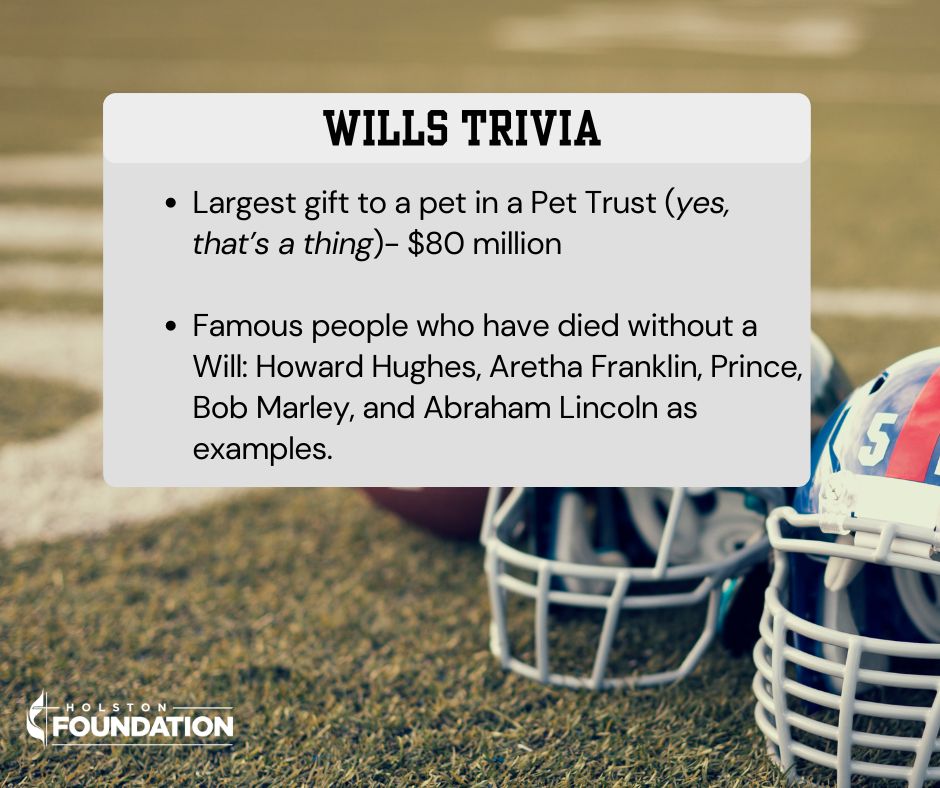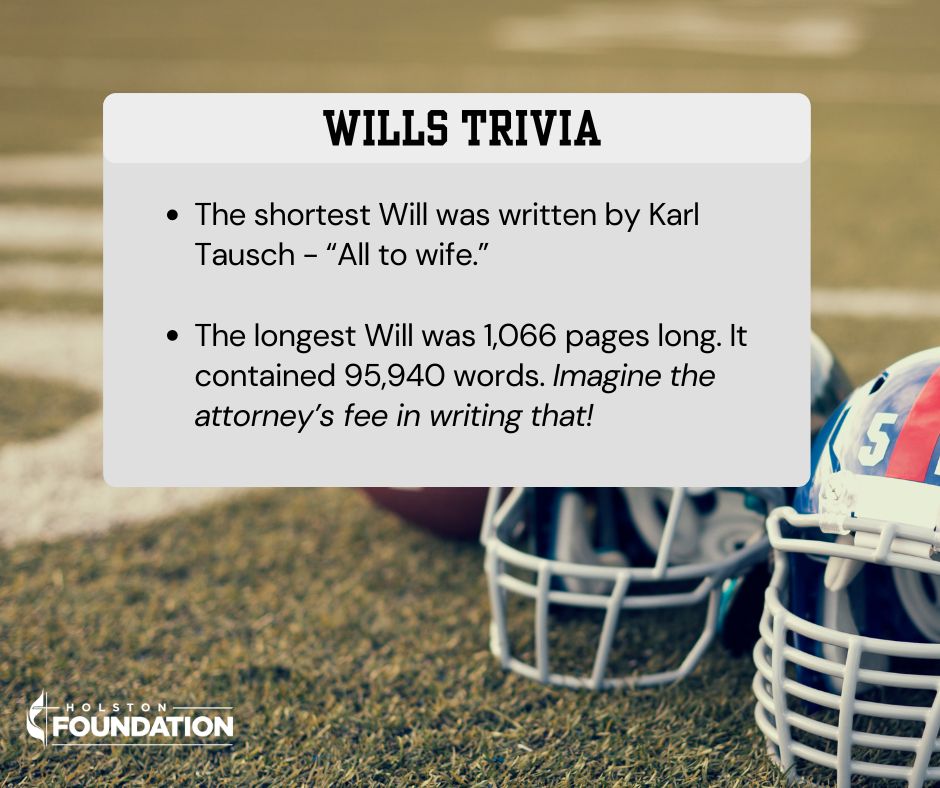Make a Game Plan, Make a Will
By Rev. Mark Gooden, Vice-President for Development
 It is August, and you know what that means is football time in Tennessee, Georgia, and Virginia. Players are practicing in the summer heat in preparation for the
It is August, and you know what that means is football time in Tennessee, Georgia, and Virginia. Players are practicing in the summer heat in preparation for the
games ahead. I am reminded of the 1961 Green Bay Packers who had lost the previous championship game to the Philadelphia Eagles. The players came into training camp expecting to do the same old things to prepare for the season. But this day was different, Coach Vince Lombardi made his famous statement “Gentleman, this is a football.” He then led them through the fundamentals of blocking, tackling, catching, and throwing. There was an intense focus on the fundamentals and the team was pushed.
When you think of August do you think of August as “National Make A Will Month?” I decided to go back to the basics by addressing common questions people wrestle with regarding Wills.
What is a Will?
“A Will is a written document that permits you to state how you want your property or estate to be distributed, name an executor… to distribute your property, pay debts and taxes, and handle other business affairs to settle your estate.”
A properly written Will ensures that what you have goes to who or what cause you wish to support outside of beneficiary documents, deeded assets, or payable upon death agreements. Most of one’s assets are distributed through a Will, commonly referred to as a bequest.
Why do I need a Will?
For most people, this question is the hardest hurdle to overcome. If one can answer the “why” then one can move forward and contact an attorney for assistance in writing a Will. This question is often met with he following objections:
- “It costs too much!” Yes, it will cost you a certain amount of money should you utilize an attorney, but it may cost you more financially to leave an incomplete and poorly worded Will. It may cost your heirs emotionally if the Will is improperly written or cannot be executed.
- “I am young and do not expect to die too soon and besides I do not want to think about death.” But if you die with no Will, a judge will choose a person to serve as an Executor to distribute your property according to the state’s intestate law and a guardian for minor children. (Hmm…it could be that person you would never choose who chooses how to distribute your assets and who decides how your child/ children are cared for until they are legal adults.
- “Only rich people need Wills.” In preparing a Will one compiles a list of assets. It may surprise one how blessed they are. Thus, a Will is an excellent opportunity to pause and reflect on the blessings of God in one’s life. James 1:17 states that “every generous and perfect gift is from Above…” When making a Will one can reflect on what it means to be stewards, not hoarders, of what God has generously given.
- “I do not want to deal with family issues.” No one really likes conflict, but if one clearly defines how and to whom their assets are distributed, it reduces the tension felt by families significantly. A Will is an opportunity to make one’s passing onto Glory much easier on those who are left behind.
Finally, often a Will is usually the only means of making sure charitable interests are supported from one’s estate. Natural heirs receiving the distribution of one’s assets through the intestate process (leaving no self-directed Will) generally do not contribute out of their inheritance to the charity or church that the decedent has supported their whole life. A Will can make that happen. (If you believe God is nudging you to give a gift to a favorite ministry the Holston Foundation staff is here to confidentially discuss that with you and the options one should consider.)
How often should I review my Will?
 It is a good idea to review your Will every 3-5 years because situations and circumstances in one’s life are always changing. For example: the birth of a child, or grandchild, retirement, an executor is no longer able to serve (we recommend having a backup or two named in the Will), one’s assets change significantly, a move to a different state (not mandatory to have a new Will but advisable to review it), or a change a divorce or remarriage occurs. One can always amend a Will with a Codicil and name individual heirs for personal non-deeded items if it does not contradict the original Will.
It is a good idea to review your Will every 3-5 years because situations and circumstances in one’s life are always changing. For example: the birth of a child, or grandchild, retirement, an executor is no longer able to serve (we recommend having a backup or two named in the Will), one’s assets change significantly, a move to a different state (not mandatory to have a new Will but advisable to review it), or a change a divorce or remarriage occurs. One can always amend a Will with a Codicil and name individual heirs for personal non-deeded items if it does not contradict the original Will.
The Holston Foundation’s staff is always available to help you explore creative ways of giving a bequest or gift to your Church or favorite ministry in your Will. George Barna wrote in How to Increase Giving in Your Church; “Most donors have a Will or estate plan. More than nine out of ten of those donors have not included a church as one of the recipients of apportion of their estate.” This often baffles pastors and church leaders as they have witnessed how much the Church was involved in the decedent’s life and yet when the Will is read, charitable giving usually focuses on their alma mater, the hospice organization, or another worthwhile charity such as a medical advocacy organization. Either they were not asked to provide for their local church or simply did not understand how the church could use their gift for Kingdom work.
Because Coach Lombardi focused on the future by getting back to fundamentals, the Packers won the NFC Championship the next year against who? The New York Giants! Coach Lombardi went on to win five championships in seven years. Fundamentals do matter for the present and the future.
Sometimes getting back to the basics is very important. Having a basic plan for the future will provide a road map for you and your loved ones to navigate the triumphs and trials that lie before you in the days and years ahead. If you need help planning a future that provides for your family, supports your favorite ministry, and glorifies God, then contact the Holston Foundation staff, we are here to serve you.
